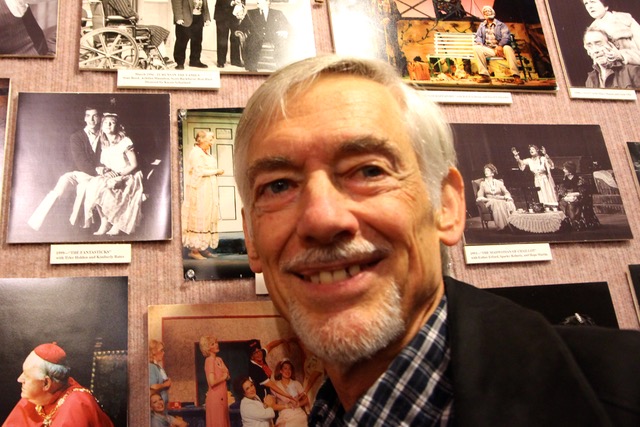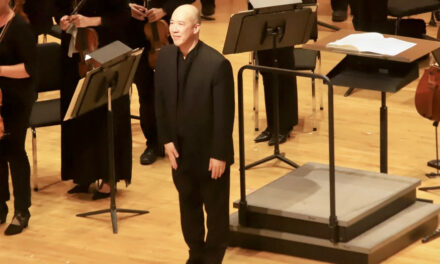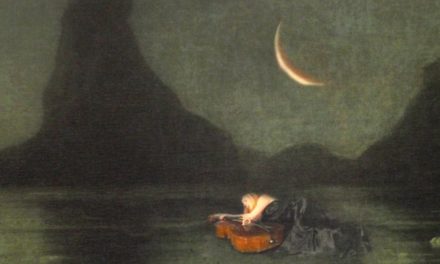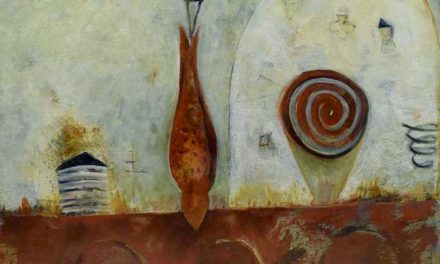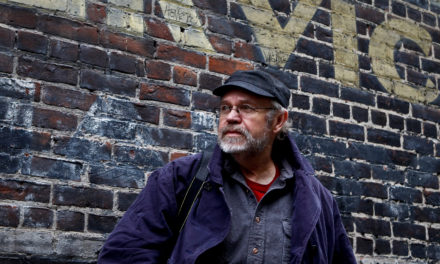(This original version of this profile appeared 0nline in November 2018 as a courtesy to Fred Crafts on his Radio Redux website, radioreduxusa.com; photo by Randi Bjornstad)
By Randi Bjornstad
One of the hallmarks of Fred Crafts’ Radio Redux re-enactments of classic radio plays of bygone decades is the ability of the actors to take on multiple roles — with distinctly differentiated voices — in a single play.
Scott Barkhurst, who has been involved with Radio Redux since its early days a decade ago, is used to the task. In one 2018 production alone, the sci-fi classic The Day the Earth Stood Still, the veteran theater actor and musician covered four —maybe even five — parts.
“I will be playing an American radio announcer, a British radio announcer, Major White, and I can’t remember the others,” Barkhurst said then. “But that’s one of the best things about being part of Radio Redux — you don’t have to memorize the roles, just create the voices of the characters.
“Another plus is that because the production is done just like the original radio plays, without sets or lots of rehearsals, it takes just a week or so to put the show together.” And finally, Barkhurst laughed, “At the end Fred hands you a check. You can’t beat all that.”
By the time Radio Redux came along, Barkhurst already had more than 40 theatrical productions to his credit, not including a lifetime of musical gigs in which he played flute and piccolo.
But his long performance history in itself made Radio Redux even more welcome, Barkhurst said.
“Once you get over 60 years old, it’s hard to find good roles,” he said. “And you don’t usually want to spend huge amounts of time for ‘chorus’ parts. With Radio Redux, that’s not a factor.”
Salesman No. 4
Barkhurst grew up in Eugene and Corvallis, graduating from South Eugene High School in 1964, during the days when impresario Ed Ragozzino was beginning to make his indelible mark on Eugene-area musical theater.
“My first show with Ragozzino was The Music Man, in 1963 or ’64,” Barkhurst said. “I was cast as Salesman No. 4.”
The mesmerizing opening number in the show, Rock Island, features a bevy of traveling salesman on a train, doing a rapid-fire spoken exchange — almost a precursor of rap — about their work travails and the questionable antics of one Harold Hill, the character in the show’s title role.
“I had the soundtrack to The Music Man, and I memorized the opening scene,” Barkhurst recalled. “I still remember it. In my life, it was one of those ‘forks in the road,’ one of those things that kind of changes your life, hearing the orchestra on opening night playing that big music and just being part of that performance.”
Another “fork in the road” came during Barkhurst’s senior year in high school when Nathaniel “Nathan” Cammack became orchestra director at South Eugene High School and the Eugene Youth Symphony as well as working with Ragozzino’s Festival of Community Theater. Cammack also played viola in the Eugene Symphony until his retirement in his early 80s, in 2013; he died in September 2018.
After high school, thanks to Cammack’s influence, Barkhurst started out at the University of Oregon with the intention of majoring in music, “but after a year-and-a-half I realized that I wasn’t good enough to be a performance major,” he recalled, “and I couldn’t visualize being a band teacher for the rest of my life.”
He went to see a guidance counselor, took an aptitude test, “and it showed that my strengths were in arts and letters, not math and science,” which he already suspected.
Still another milestone came when one of his fraternity brothers asked him to help sketch a beach scene for an advertising layout class he was taking, “and he told me he was a journalism major,” Barkhurst said.
“I had been involved in working on the yearbook in high school, but I always thought that journalism meant just writing and editing. But when I learned that it also could mean advertising, public relations, and broadcast, I decided to try it out.”
He took an introductory course the next term and loved it, “so I changed my major,” Barkhurst said. “But I still kept music as an unofficial minor, and I still kept playing flute and piccolo.”
Those years, of course, were approaching the peak years of the Vietnam war, and he learned that the same fraternity brother was a member of the Navy R.O.T.C., which allowed young men of draftable age to defer the possibility of being drafted during their college careers in exchange for enlisting afterward.
“My friend was a bit older, and after college he went into the Naval officers school and became a public relations officer. So I decided to try to follow the same path,” Barkhurst said. “I put journalism down as my first choice, but the officer told me there was only about a chance of one in a hundred that I would get that assignment, and that I would be much more likely to be assigned to something like becoming a signalman on an aircraft carrier.”
Then, suddenly, “I thought of the man who had been my flute teacher, and remembered that he had played flute in the Army Band,” Barkhurst said. “So I said, ‘You do have music groups in the Navy, don’t you? Because I play the flute.”
Yes, came the answer, but it’s by audition, and it’s very hard to get accepted. Barkhurst said he was willing to try, and he was told he would be auditioned the next day.
“I went there and did my usual warmup, scales and stuff,” he recalled. “The guy came in and said he’d heard all that so there was no need to repeat it. So he had me play some marches, which was easy because I had done a lot of that in band.
“Then came sight reading, and after a couple of minutes the guy said, ‘Well, I guess I don’t need to hear any more.’ I thought sure I had failed, but then he said, ‘You must have had a wonderful teacher,’ and I was accepted.”
At that point, Barkhurst was told that that after boot camp he would spend six months in musical training, followed by a year on a ship and then two more years on a Naval base. He was sent to training in Norfolk, Va., “where male flute players were in very short supply.”
“In high school, almost all the flute players had been girls, so when it came to the military, where women at that time weren’t allowed in the bands, there were few guys playing flute,” he said.
Barkhurst quickly learned the the shortage of male flutists meant that many of them did not get assigned to ships and bases but were appointed directly to the primo assignments as members of the military concert bands, “and a month before graduation I was called in and told that the U.S. Navy Band in Washington, D.C., needed a flute player for six months, and I should go to audition.”
He checked in for the audition, and while walking through the halls could hear the concert band in practice.
“They were the best musicians I had ever heard, so I thought my chances weren’t very good, especially when I found out that a guy named Henry Hoffman was one of the three judges, and he had a flute performance degree from the Juilliard School, and another guy had a degree from the Eastman School.”
The audition went “straight to the classics — it was a real professional audition,” Barkhurst remembered. “Fortunately, I had been practicing for at least a month by then, so I felt that I was at about 95 percent, and I gave it my best shot.”
Afterward, Hoffman told Barkhurst to go have a seat, “and then he came and told me he wanted to introduce me to the leader of the band, who was a big guy with silver hair who was smoking a pipe.
“He said to me, ‘You have a degree from the University of Oregon?’ “, and Barkhurst’s heart sank as he had to admit it wasn’t in music but journalism.
“Journalism? Could you do public relations for us, too?” the band leader asked, and Barkhurst was in. “It was all I could do not to look up to see if there was some guardian angel there looking after me,” he said.
He played flute in a ceremonial band for a year, then spent two years traveling with the concert band throughout the eastern half of the United States. Upon leaving the service, he returned to Oregon, did some graduate work at the UO, and resumed his musical and theatrical performance activities in his spare time.
His day jobs included becoming the advertising manager for the locally owned Tiffany’s drugstore chain from 1974-88, then moving to the UO music school where he spent the next 23 years directing public relations until his retirement in 2011.
He and his wife, pianist, singer and music teacher Marlene Barkhurst, both remain active in performing at First United Methodist Church in Eugene. He still appears regularly on theater stages, including Actors Cabaret of Eugene, The Shedd Institute for the Arts, and the Very Little Theatre as well as Radio Redux.
Looking back, Barkhurst picks a few high points in his acting career.
“I loved doing It Runs in the Family at the Very Little Theatre in 1996, and at Lane Community College in 1988 when I was Audrey II in Little Shop of Horrors,” he said. “I tried out for that again when VLT did it earlier this year, but I got beat out for the part by Scott Machado, who did a great job.”
Another all-time favorite role was the wise man, Mr. Lundie, in Brigadoon, which Barkhurst did at The Shedd in 2008 and again in 2018 at Actors Cabaret of Eugene.
A real Mel Blanc fan
One of the reasons Barkhurst finds doing voices for Radio Redux easy and fun is his lifelong fascination with cartoon voices.
“I grew up watching cartoons, and Mel Blanc, who was the king of the voice actors, was a favorite,” he said. I was single back then, and I would get invited to a lot of other people’s homes, so I was looking for a way to reciprocate, and I wanted to do it when there was nice weather. So when I realized realized that Mel Blanc’s birthday was May 30, it seemed perfect.”
He sent out potluck invitations peopled with cartoon characters, and everybody would watch videotapes of cartoons with Mel Blanc’s voices. The party quickly became a tradition.
Somewhere in the mid-1980s, someone at the party said he thought Blanc had died sometime earlier that year, “and someone else had told me the same thing before,” Barkhurst said. Then, about three months later, one of them called to apologize. He told me that he knew someone who knew Mel Blanc well, and that ‘Mel Blanc lives.’ “
That December, no doubt thanks to that friend-of-Blanc, Barkhurst received a publicity picture in the mail of the voice actor, surrounded by images of his characters, and signed, ‘Merry Christmas, Mel Blanc.’ I framed that picture and hung it in my dining room.”
The next May, “I sent a a thank-you message, a picture of my previous year’s party, and an invitation to that year’s party to Mel Blanc’s office,” he said. “An hour into the party, the phone rang. I answered it, and someone said, ‘Hello, Doc, is this Scott Barkhurst?’ I couldn’t believe it. He said, ‘I appreciate the invitation, but guys in their 80s don’t get out a lot, but I still do some work. I appreciate what you’re doing up there in Eugene.’
“So we all gathered around and sang Happy Birthday to him, in four-part harmony.”
The next year Blanc called again, and the one after. But the fourth year, in 1989, there wasn’t a call.
“I found out later the he had died a few weeks after the party,” Barkhurst said. “Somewhere along the way, I bought his autobiography, and I was surprised to learn that he spent part of his childhood in Portland, and went to Lincoln High School.”
As a young man, Blanc also had performed in vaudeville shows throughout Oregon, Washington, and northern California.
“Maybe that’s why he responded when he heard about our parties in Eugene,” Barkhurst said. “That is a really special memory.”

